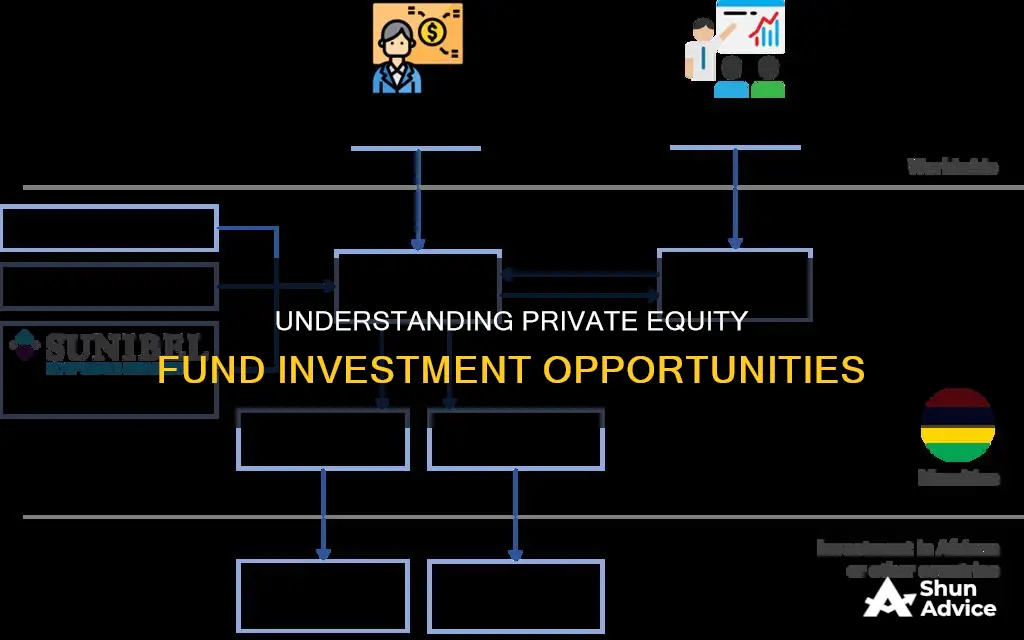
Private equity funds are pools of capital that are used to invest in companies that are not publicly traded on stock exchanges. These funds are managed by private equity firms, which act as advisers, pooling together money from multiple investors to make investments on behalf of the fund. Private equity funds are typically open only to accredited investors and qualified clients, such as institutional investors and high-net-worth individuals, as they require substantial capital to be committed for extended periods of time. The investment strategy of private equity firms involves buying companies, often mature but struggling businesses, and then working to increase their value before selling them for a profit. This process may include restructuring finances and operations, improving management, and developing new products and strategies. Private equity funds are known for their long-term investment horizon, typically ranging from four to twelve years, during which investors' capital is locked up and illiquid.
What You'll Learn
- Private equity funds are pools of capital to be invested in companies with a high rate of return potential
- Private equity funds are not subject to regular public disclosure requirements
- Private equity funds are open only to accredited investors and qualified clients
- Private equity funds are managed by general partners, who make investment decisions
- Private equity funds are designed for investors with long time horizons

Private equity funds are pools of capital to be invested in companies with a high rate of return potential
Private equity funds are often associated with venture capital and hedge funds as alternative investment classes. They are typically open only to accredited investors and qualified clients, such as institutional investors and high-net-worth individuals. The initial investment amount is usually very high, and investors are required to commit significant capital for years.
Private equity funds focus on long-term investment opportunities, with an investment time horizon of around 10 years or more. They typically take a controlling interest in an operating company and actively engage in its management and direction to increase its value. This may involve turning around struggling operations by cutting costs, selling off assets, or restructuring the company.
Private equity funds can buy companies that are already private or take a controlling interest in publicly traded companies and take them private by delisting them from the stock exchange. The funds usually have a fixed investment horizon, ranging from four to seven years, at which point they aim to exit the investment profitably. Exit strategies include initial public offerings (IPOs) and the sale of the business to another private equity firm or a strategic buyer.
The allure of private equity funds is the potential for higher returns compared to public markets, although this is not guaranteed. The funds' long-term nature may shelter them from public market volatility, and patient investors may be rewarded for their commitment. However, the long lockup periods also mean that investors cannot access their liquidity unless they sell their shares on the secondary market.
Axis Midcap Fund: Is It Worth Your Investment?
You may want to see also

Private equity funds are not subject to regular public disclosure requirements
Private equity funds are pools of capital that are used to invest in companies presenting an opportunity for a high rate of return. They are typically managed by private equity firms, which often focus on long-term investment opportunities in assets that take time to sell. The funds themselves are not traded on public markets and are instead open only to accredited investors and qualified clients, such as institutional investors and high-net-worth individuals.
The lack of public disclosure requirements for private equity funds means that investors must be vigilant about the fees and expenses incurred in connection with their investment. It also makes it challenging to compare the performance of private equity funds to public equity funds. However, private equity funds are subject to certain regulations, such as the Investment Advisers Act of 1940 and the anti-fraud provisions of federal securities laws in the United States.
The private nature of these funds allows them to take a "patient" perspective, focusing on long-term strategic goals rather than quarterly earnings. This can potentially generate significant returns on investment. Additionally, private equity funds have exhibited attractive performance on both a risk-adjusted and an absolute basis.
Overall, the lack of regular public disclosure requirements for private equity funds is a result of their structure and regulatory framework. This privacy allows for a long-term investment approach, which has contributed to the attractive performance of private equity as an asset class.
Aquamarine Fund: A Guide to Investing in Water's Treasure
You may want to see also

Private equity funds are open only to accredited investors and qualified clients
Private equity funds are not open to everyone. They are only available to accredited investors and qualified clients. This is because private equity funds require investors to commit significant capital for years.
Accredited investors and qualified clients include institutional investors, such as insurance companies, university endowments, and pension funds, as well as high-income and high-net-worth individuals. The Securities and Exchange Commission (SEC) sets guidelines for accredited investors based on income or net worth.
Investment minimums to join a private equity fund are typically very high, usually starting at $250,000 but often running into the millions. This is because private equity funds are pools of capital that are used to invest in companies that represent an opportunity for a high rate of return. They come with a fixed investment horizon, typically ranging from four to seven years, at which point the private equity firm hopes to profitably exit the investment.
Private equity funds are often grouped with venture capital and hedge funds as an alternative investment. They are a type of private capital for financing a long-term investment strategy in an illiquid business enterprise. Due to their long-term investment horizon, an investment in a private equity fund is often illiquid, and it may be necessary to hold an investment for several years before any return is realised.
Even if you are not directly invested in private equity funds, you may be indirectly invested in them if you participate in a pension plan or own an insurance policy. Pension plans and insurance companies may invest some portion of their large portfolios in private equity funds.
Vanda Hedge Fund: A Smart Investment Strategy
You may want to see also

Private equity funds are managed by general partners, who make investment decisions
Private equity funds are managed by general partners, who make all the fund's investment decisions. These general partners are typically the private equity firm that established the fund. The fund's investors, on the other hand, are known as limited partners.
General partners manage the fund's money and make the investment decisions. They raise money from limited partners to create a fund, and once they reach their capital goal, they close the fund and start investing.
General partners will often buy companies with plans to turn around struggling operations by cutting costs or selling off assets. They may also invest in mature companies that are struggling, with the goal of increasing their worth. They may also invest in startups or fast-growing companies, or they may take a controlling interest in a publicly traded company and take it private by delisting it from the stock exchange.
General partners may also contribute 1% to 3% of the fund's capital to ensure they have skin in the game. In return, they earn a management fee, often set at 2% of fund assets, and may be entitled to 20% of fund profits above a preset minimum as incentive compensation, known as carried interest.
Private equity funds are pools of capital that are invested in companies that represent an opportunity for a high rate of return. They are often funded by institutional investors and accredited investors, who can provide substantial capital for extended periods. The funds are used to invest in private companies or to buy out public companies.
Private equity funds have a fixed investment horizon, typically ranging from four to seven years, at which point the fund managers aim to exit the investment profitably.
Lifecycle Funds: A Smart Investment Strategy for Long-Term Goals
You may want to see also

Private equity funds are designed for investors with long time horizons
Private equity funds are known for their long-term investment horizon, typically ranging from 4 to 7 years but can be as long as 10 years or more. This long-term horizon is due to the nature of the investments made by private equity firms. They often focus on buying and managing private companies, particularly mature but struggling businesses, with the goal of turning them around and increasing their value over time. This process can take several years and may involve restructuring the company's operations, finances, or management.
The long time horizon of private equity funds is also reflected in the illiquid nature of the investments. Investors typically cannot withdraw their money during the fund's life, which can span many years. This illiquidity is a key consideration for investors, as they may not have access to their capital for an extended period. The funds are designed without the option for redemptions, and investors who need to access their funds early may have to sell their shares on the secondary market, potentially at a loss.
The long time horizon of private equity funds is aligned with the goal of maximizing returns over the long term. Private equity firms aim to generate higher returns compared to public markets by enhancing the performance of the companies they invest in. This may involve improving operations, acquiring new businesses, developing new products, or optimizing the capital structure. The long-term horizon allows private equity firms to implement these strategies and realize their benefits over time.
Additionally, the long time horizon of private equity funds is supported by the lockup period associated with the investments. During the initial years of the fund, limited partners commit their capital, and the rest of the time is spent waiting for a return on the investment. The true success of the investment is typically only known once the fund reaches the end of its life cycle and is wound down. This long lockup period shelters the investments from short-term market volatility and can result in higher returns for patient investors.
In summary, private equity funds are designed for investors with long time horizons due to the nature of the investments, the illiquid structure, the goal of maximizing long-term returns, and the lockup period associated with the funds. These factors make private equity funds suitable for investors who are willing and able to commit their capital for an extended period.
Medmen Opportunity Fund: Investing in Cannabis Innovation
You may want to see also
Frequently asked questions
A private equity fund is a type of investment fund that pools capital from various investors to invest in companies that are not publicly traded on stock exchanges. These funds are typically managed by private equity firms or investment managers, who act as general partners and make investment decisions on behalf of the fund. The investors, who provide the capital, are known as limited partners.
Private equity funds aim to generate returns by enhancing the performance and value of the companies they invest in. This may involve improving operations, acquiring new businesses, restructuring finances, or optimizing capital structure. Ultimately, the goal is to exit the investment profitably through strategies such as initial public offerings (IPOs) or selling the business to another private equity firm or strategic buyer.
Private equity funds are typically open only to accredited investors and qualified clients, which include institutional investors such as pension funds, insurance companies, and university endowments, as well as high-net-worth individuals. The investment minimums are usually very high, starting at $250,000 but often going into the millions.
Private equity investments are considered illiquid and often have long lock-up periods, typically ranging from 4 to 12 years. During this time, investors may not be able to withdraw their funds easily. Additionally, private equity funds are not regulated by the Securities and Exchange Commission (SEC) and are not subject to regular public disclosure requirements, making it challenging for investors to conduct thorough due diligence.







